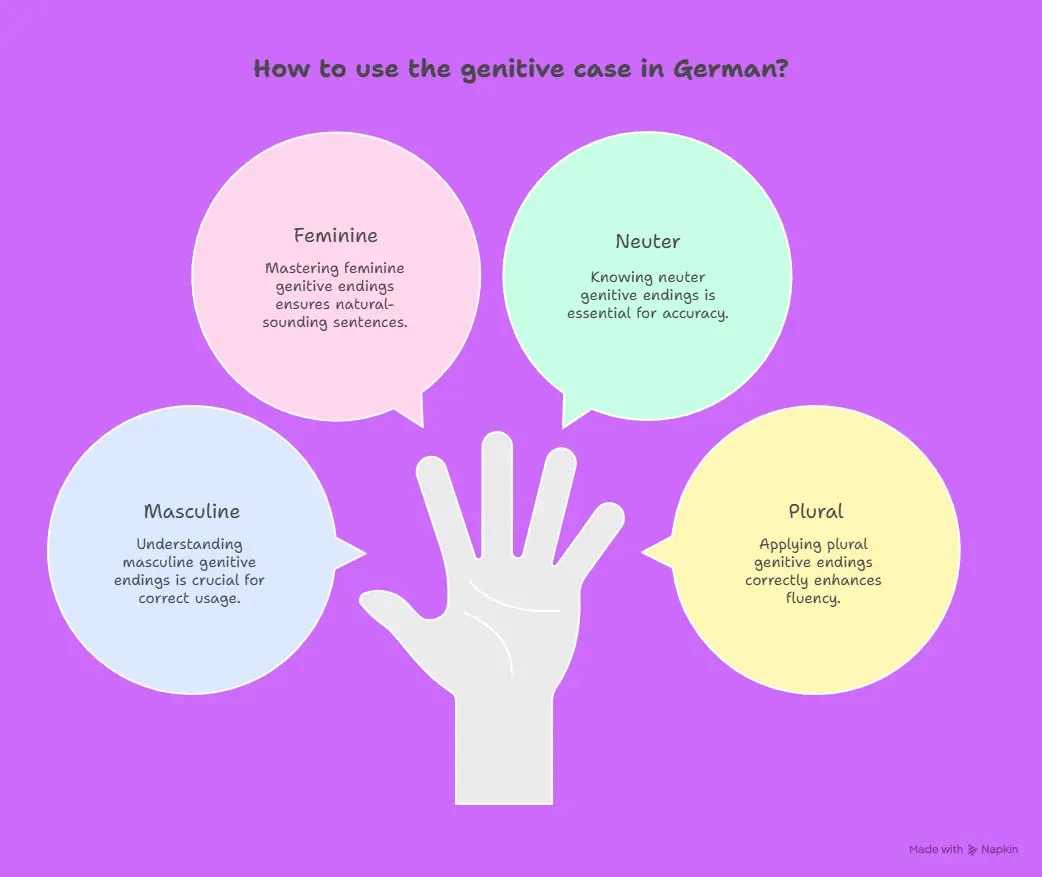Table of Contents
In the German language, you are free to utilize any one of the four different cases offered. In this category, the genitive case is considered to be one of them. The many ways in which nouns may be used in phrases are shown by the instances presented below. The nominative, accusative, and dative forms are not considered in any way throughout the whole of this article. Within the context of the nominative case, the argument is being debated. Direct objects are presented in the accusative case, whereas secondary objects are displayed in the dative case. The accusative case is used to show the direct object. This is shown by the genitive case, which denotes that one word is linked to or belongs to another word. This is a nice example of this. It is conceivable to translate the phrase “das Haus des Lehrers” as “the teacher’s house” or “the house of the teacher.” Both of these interpretations are viable. For the translation, there are two distinct approaches that might be used.
Individuals are expected to utilize the genitive case when they are discussing something that is intellectual, funny, or polite. This is a commonplace practice. In addition to this, it must be put after a variety of prepositions, such as statt (which means “instead of”), trotz (which means “despite”), and während (which means “During”). At this point in time, the dative case is the one that is used the bulk of the time when people are speaking German. In spite of this, the fact that you are able to employ the genitive form proves that you have a solid grasp of the language and grammar. When you are able to speak and write German correctly, you will be able to communicate more successfully, and you will also be able to make your work more engaging, accurate, and sophisticated.
Learn German language in your own language! Get free Demo Classes Here!
What is the Genitive Case in German?
The genitive case is when one German word owns, refers to, or is part of another noun. “Whose?” is the question it generally answers. It’s not obvious what the German phrase means. In English, we may show that something belongs to someone by using the letter “s” or the word “of.” “The book of Anna” or “Anna’s book” are two suitable examples. The book is called the Buch Annas or the Buch der Lehrer in German. This means “teacher’s book.”
The genitive case may be followed by the nouns während (“during”), trotz (“despite”), statt (“instead of”), or wegen (“wegen,” “because of”). The accusative is necessary in writing and legal German, while the dative is more prevalent in daily speech. Students who know how to use the genitive phrase write lines that are clearer, more polished, and free of grammatical problems.
Difference Between Nominative, Accusative, Dative, and Genitive
| Case | Main Function | Question it Answers | Example (English) | Example (German) | Translation |
|---|---|---|---|---|---|
| Nominative | Subject (who/what does the action) | Wer? / Was? | The man eats. | Der Mann isst. | The man eats. |
| Accusative | Direct object (who/what receives the action) | Wen? / Was? | I see the man. | Ich sehe den Mann. | I see the man. |
| Dative | Indirect object (to/for whom something is done) | Wem? | I give the man a book. | Ich gebe dem Mann ein Buch. | I give the man a book. |
| Genitive | Possession or relationship | Wessen? | The man’s book. | Das Buch des Mannes. | The book of the man. |
Here is a simple picture that shows how each case works in a sentence:
┌────────────────────────────┐
│ NOMINATIVE │
│ (Subject – does action) │
│ → Der Mann isst. │
└────────────────────────────┘
│
▼
┌────────────────────────────┐
│ ACCUSATIVE │
│ (Direct Object – receives) │
│ → Ich sehe den Mann. │
└────────────────────────────┘
│
▼
┌────────────────────────────┐
│ DATIVE │
│ (Indirect Object – for/to) │
│ → Ich gebe dem Mann ein Buch. │
└────────────────────────────┘
│
▼
┌────────────────────────────┐
│ GENITIVE │
│ (Possession / Relationship)│
│ → Das Buch des Mannes. │
└────────────────────────────┘
When to Use the Genitive Case in German
The genitive case is often used to show who owns something, who is related to someone, or who belongs to someone. It commonly answers the query “Wessen?” (Whose?). It also comes after certain prepositions and in a few fixed phrases that are still widespread in formal or written German. Let’s look at these usage with some clear examples.
1. Possession
| Gender / Number | Definite Article | Example | Meaning |
|---|---|---|---|
| Masculine | des | Das Auto des Mannes | The man’s car / The car of the man |
| Feminine | der | Die Tasche der Frau | The woman’s bag / The bag of the woman |
| Neuter | des | Das Ende des Films | The end of the film |
| Plural | der | Die Stimmen der Kinder | The voices of the children |
2. Prepositions That Require the Genitive Case
When specific prepositions are used, the genitive case is often used instead. In formal or written German, these are the language that people commonly employ.
| Preposition | Meaning | Example | Translation |
|---|---|---|---|
| während | during | Während des Sommers reisen wir viel. | During the summer, we travel a lot. |
| trotz | despite | Trotz des Regens gingen wir spazieren. | Despite the rain, we went for a walk. |
| wegen | because of | Wegen des Unfalls kam er zu spät. | Because of the accident, he was late. |
| statt / anstatt | instead of | Statt des Kuchens brachte sie Obst. | Instead of the cake, she brought fruit. |
| innerhalb | within | Innerhalb des Hauses ist es warm. | It’s warm inside the house. |
| außerhalb | outside of | Außerhalb der Stadt ist es ruhig. | It’s quiet outside the city. |
3. Expressions and Fixed Phrases Using the Genitive
In addition, the genitive is used in a variety of idiomatic or fixed expressions, which may be heard or read in official correspondence or writing, including the following:
| German Expression | Meaning in English |
|---|---|
| eines Tages | one day / someday |
| meines Wissens | to my knowledge |
| letzten Endes | in the end / ultimately |
| angesichts des Problems | in view of the problem |
| kraft des Gesetzes | by virtue of the law |
| trotz des Wetters | despite the weather |
How to Form the Genitive Case in German
For the purpose of indicating that something is owned by someone else or that it belongs to someone else, the genitive case modifies the endings of nouns and articles in very subtle but very significant ways. Rules for each gender are divided into several categories, such as masculine, feminine, neuter, and numerous. These categories are discussed further below. You will be able to compose sentences in German that are not only correct in terms of syntax but also sound natural if you have a deep understanding of these patterns.
1. Masculine, Feminine, Neuter, and Plural Rules
In the genitive case, masculine and neuter nouns often have an ending that is either -s or -es, although feminine and plural nouns do not change their endings. Additionally, the article differs depending on the gender of the reader as well as whether it is definite (the) or indefinite (a/an).
2. Changes in Definite and Indefinite Articles
| Gender / Number | Definite Article (the) | Indefinite Article (a/an) | Example (German) | Meaning (English) |
|---|---|---|---|---|
| Masculine | des | eines | des Mannes / eines Mannes | of the man / of a man |
| Feminine | der | einer | der Frau / einer Frau | of the woman / of a woman |
| Neuter | des | eines | des Kindes / eines Kindes | of the child / of a child |
| Plural | der | — | der Kinder | of the children |
3. Noun Endings in the Genitive
-
Masculine and Neuter nouns take an additional -s or -es ending.
-
Usually, -s is added to short nouns ending in a vowel:
→ des Autos (of the car), des Lehrers (of the teacher) -
-es is added to nouns ending in sibilant sounds (s, ß, x, z, sch):
→ des Hauses (of the house), des Fuchses (of the fox)
-
-
Feminine and Plural nouns do not add any ending:
→ der Frau (of the woman), der Kinder (of the children)
4. Quick Reference Tables
Definite Articles (the)
| Gender | Nominative | Accusative | Dative | Genitive |
|---|---|---|---|---|
| Masculine | der | den | dem | des |
| Feminine | die | die | der | der |
| Neuter | das | das | dem | des |
| Plural | die | die | den | der |
Indefinite Articles (a/an)
| Gender | Nominative | Accusative | Dative | Genitive |
|---|---|---|---|---|
| Masculine | ein | einen | einem | eines |
| Feminine | eine | eine | einer | einer |
| Neuter | ein | ein | einem | eines |
| Plural | — | — | — | — |
Noun Endings in Genitive Case
| Gender | Example Noun | Genitive Form | Translation |
|---|---|---|---|
| Masculine | der Mann | des Mannes | of the man |
| Feminine | die Frau | der Frau | of the woman |
| Neuter | das Haus | des Hauses | of the house |
| Plural | die Kinder | der Kinder | of the children |
Genitive Case Examples in German
1: How do you say "Good Morning" in German?
It is possible to demonstrate ownership, connection, or belonging between nouns by using the genitive case on them. Here are several simple examples, as well as some more complex ones, along with English translations, so that you may have a better understanding of how it operates at the basic, intermediate, and advanced levels.
Simple Examples for Beginners
| German Sentence | English Translation | Explanation |
|---|---|---|
| Das Auto des Mannes ist neu. | The man’s car is new. | des Mannes → shows possession (the car belongs to the man). |
| Die Tasche der Frau ist schön. | The woman’s bag is beautiful. | der Frau → shows possession (the bag belongs to the woman). |
| Das Ende des Films war traurig. | The end of the film was sad. | des Films → neuter noun in genitive, adds -s. |
| Die Stimmen der Kinder sind laut. | The children’s voices are loud. | der Kinder → plural genitive (no noun ending change). |
| Das Buch des Lehrers liegt auf dem Tisch. | The teacher’s book is on the table. | des Lehrers → masculine genitive with -s. |
Complex Sentences for Advanced Learners
| German Sentence | English Translation | Explanation |
|---|---|---|
| Trotz des schlechten Wetters gingen wir spazieren. | Despite the bad weather, we went for a walk. | des schlechten Wetters → used after the preposition trotz, which requires genitive. |
| Während des Unterrichts soll man nicht sprechen. | During the lesson, one should not speak. | des Unterrichts → während (during) always takes the genitive. |
| Wegen des Unfalls kam der Zug zu spät. | Because of the accident, the train was late. | wegen (because of) requires genitive. |
| Die Farbe des Himmels verändert sich bei Sonnenuntergang. | The color of the sky changes at sunset. | des Himmels → masculine noun with -s ending. |
| Anstelle des Lehrers hielt die Schülerin die Rede. | Instead of the teacher, the student gave the speech. | des Lehrers → anstelle (instead of) takes genitive. |
| Der Erfolg des Projekts hängt von der Teamarbeit ab. | The success of the project depends on teamwork. | des Projekts → neuter noun ending in -s. |
| Die Entscheidung des Richters war gerecht. | The judge’s decision was fair. | des Richters → masculine genitive with -s. |
| Innerhalb des Hauses ist es wärmer als draußen. | Inside the house, it is warmer than outside. | innerhalb (within) always takes the genitive. |
Ready to take your German language skills to the next level? Get Free Demo Classes Here!
Speak German Fluently – Your Future Starts Here!
Join our interactive German courses designed for all levels. Gain the skills to communicate effectively and open doors to new cultures and careers.
Start Learning GermanCommon Mistakes in the Genitive Case
1. Confusing Genitive with Dative
It is one of the most common errors to confuse the genitive and dative cases. This is due to the fact that both cases may come after prepositions and often have a form that is similar to one another.
Die Tasche dem Mann ist neu.
(Used dative “dem Mann” instead of genitive.)
Die Tasche des Mannes ist neu.
Shows possession — “The man’s bag is new.”
2. Omitting the Genitive Case in Spoken German
It is common for native German speakers to utilize the dative case rather than the genitive case when they are speaking in everyday conversation. People often engage in this behavior while they are conversing; however, it is impolite and ought to be avoided when writing or speaking in a professional setting.
Wegen dem Regen bleibe ich zu Hause. (Dative)
Wegen des Regens bleibe ich zu Hause. (Genitive)
“Because of the rain, I’m staying home.”
3. Overusing “von + Dative” Instead of the Proper Genitive
The genitive case is not always used when English speakers understand terms like “the book of the teacher” because they occasionally take the phrase “the book of the teacher” too literally. Although the use of the word “von” (which means “of/from”) is strictly correct, using it too often makes your German seem less natural and less scholarly.
Das Buch von dem Lehrer ist interessant.
Das Buch des Lehrers ist interessant.
“The teacher’s book is interesting.”
Exercises and Practice
If you complete the activities that are listed below, you will be able to learn how to correctly use the genitive case. You should carefully look over each category, from fill-in-the-blank to conversion, and then check your answers with the explanations that come with each category.
Fill-in-the-Blank Exercises
👉 Complete each sentence with the correct genitive form of the word in brackets.
-
Das Auto ___ (der Mann) ist sehr teuer.
-
Die Farbe ___ (der Himmel) ist heute wunderschön.
-
Trotz ___ (der Regen) gingen wir spazieren.
-
Der Garten ___ (die Nachbarn) ist groß.
-
Während ___ (der Unterricht) sollen die Schüler ruhig sein.
-
Wegen ___ (das Kind) blieben die Eltern zu Hause.
-
Die Tür ___ (das Haus) ist offen.
-
Die Kleidung ___ (die Kinder) liegt überall.
Answers with Explanations
-
des Mannes → Das Auto des Mannes ist sehr teuer.
→ “The man’s car is very expensive.” (Masculine noun → des + -es) -
des Himmels → Die Farbe des Himmels ist heute wunderschön.
→ “The color of the sky is beautiful today.” (Masculine noun ending with -s) -
des Regens → Trotz des Regens gingen wir spazieren.
→ “Despite the rain, we went for a walk.” (trotz requires genitive) -
der Nachbarn → Der Garten der Nachbarn ist groß.
→ “The neighbors’ garden is large.” (Plural noun → der) -
des Unterrichts → Während des Unterrichts sollen die Schüler ruhig sein.
→ “During the lesson, students should be quiet.” (während takes genitive) -
des Kindes → Wegen des Kindes blieben die Eltern zu Hause.
→ “Because of the child, the parents stayed home.” (wegen + genitive) -
des Hauses → Die Tür des Hauses ist offen.
→ “The door of the house is open.” (Neuter noun → des + -es) -
der Kinder → Die Kleidung der Kinder liegt überall.
→ “The children’s clothes are lying everywhere.” (Plural → der + no noun ending)
Conversion Exercises
👉 Convert the following nominative or dative sentences into genitive form to express possession.
-
Nominative: Der Hund gehört dem Mann.
Genitive: ______________________________ -
Nominative: Das Kleid gehört der Frau.
Genitive: ______________________________ -
Dative: Ich spiele mit dem Kind.
Genitive: ______________________________ -
Nominative: Die Tasche gehört den Mädchen.
Genitive: ______________________________
Answers with Explanations
-
Das ist der Hund des Mannes.
→ “That is the man’s dog.”
(Masculine noun → des + -es) -
Das ist das Kleid der Frau.
→ “That is the woman’s dress.”
(Feminine noun → der) -
Das Spielzeug des Kindes ist bunt.
→ “The child’s toy is colorful.”
(Neuter noun → des + -es) -
Die Taschen der Mädchen sind teuer.
→ “The girls’ bags are expensive.”
(Plural noun → der)
Tips to Remember the Genitive Case in German
When it comes to the genitive case, it might be difficult to grasp, but with certain strategies, mnemonics, and constant practice, you can become an expert. The following is an organized guide:
Mnemonics and Memory Tricks
-
“Wessen?” = Whose?
-
Always ask Wessen? when trying to determine possession. If it answers whose something is, it’s genitive.
-
Example: Das Buch des Lehrers → Whose book? → the teacher’s book
-
-
“des / der + noun ending” trick
-
Masculine & neuter nouns → des + -s / -es
-
Feminine & plural nouns → der (no ending)
-
Mnemonic sentence:
“Des Mannes Haus, der Frau Tasche, des Kindes Spielzeug, der Kinder Kleidung”
-
Repeat it aloud; it covers all genders and plural.
-
-
-
Preposition Memory:
-
Remember the common genitive prepositions with the acronym “WET STA”:
-
Während – during
-
Entsprechend – according to
-
Trotz – despite
-
Statt / Anstatt – instead of
-
Außerhalb / Anlässlich – outside of / on the occasion of
-
-
Associating them with a word or visual can help recall which prepositions always require genitive.
-
-
Visual Possession Map:
-
Draw arrows from the owner → owned item:
-
des Mannes → Auto
-
der Frau → Tasche
-
-
Visual links reinforce the “possession” idea in your mind.
-
Recommended Books and Online Resources
Books
-
Hammer’s German Grammar and Usage—Martin Durrell (Comprehensive grammar with genitive explanations)
-
Practice Makes Perfect: Complete German Grammar – Ed Swick (Exercises and examples)
-
German Quickly: A Grammar for Reading German – April Wilson (Concise rules and genitive usage)
Online Resources:
-
DW Learn German – Free grammar lessons and exercises
-
GermanVeryEasy – Simple explanations with examples
-
Lingolia German Grammar – Clear genitive tables and exercises
-
YouTube Channels: Learn German with Anja, Deutsch mit Marija—Focused videos on genitive case
Speak German Fluently – Your Future Starts Here!
Join our interactive German courses designed for all levels. Gain the skills to communicate effectively and open doors to new cultures and careers.
Start Learning GermanConclusion
The genitive case formation is very important in German grammar. The most typical use of this phrase is to show that one noun owns, is linked to, or belongs to another noun. It answers the query “Wessen?” (Whose?) and is widely employed in formal writing, literature, and speeches. Students may make statements that are not only grammatically accurate but also clear, elegant, and lovely by using the genitive. This is particularly apparent when pupils want to show ownership, use certain prepositions, or employ set phrases like “one day” or “my knowledge.”
Ready to take your German language skills to the next level? Get Free Demo Classes Here!
Speak German Fluently – Your Future Starts Here!
Join our interactive German courses designed for all levels. Gain the skills to communicate effectively and open doors to new cultures and careers.
Start Learning GermanFrequently Asked Questions
Can genitive be replaced by dative?
In spoken German, it often is (e.g., wegen dem Regen instead of wegen des Regens), but in formal writing, the genitive is preferred.
When should I use the genitive case?
To indicate possession (des Mannes Auto – the man’s car)
After certain prepositions (während, trotz, wegen, statt, innerhalb)
In fixed expressions (eines Tages, meines Wissens)
Are there common fixed expressions using the genitive?
Yes










